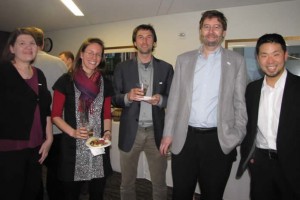Submitted by Nicole Johns
on
New assistant Professor Mu-Jeung Yang presented the annual Nobel Prize lecture recently to an audience of alumni, faculty, and students interested in learning more about the work in market design of the 2012 Nobel laureates Al Roth and Lloyd Shapely. Dr. Yang presented "From Inception to Implementation: Market Design from Labor Markets to Kidney Exchanges." At the heart of Roth and Shapely's efforts is a remarkable economic challenge: how should markets work without prices guiding the decisions of buyers and sellers? Could an algorithm be devised to match potential buyers to sellers? And how would this algorithm have to be designed to ensure that matched pairs of buyers and sellers have the incentive to stick to their matches instead of unraveling their promises?  Mu-Jeung Yang, right, pictured at the lecture with fellow economics faculty (from left): lecturer Melissa Knox, assistant professor Rachel Heath, assistant professor Hendrik Wolff, and professor and department chair Jacques Lawarrée. Behind Shapley and Roths' work is a tale of unintended discovery and belated recognition. It is a tale of theoretical work, which was not published in prestigious economic journals and did not threaten existing paradigms in the highest echelons of academia. Rather, the key conceptual ideas were published in a little known journal, which targets a general interest audience of mathematicians rather than expert economists. In short, this is the story of scientific underdogs who changed the way economists think about the design of markets. And more remarkably, literally save lives in the process. Learn more about the 2012 laureates and their work at NobelPrize.org. You might also be interested in a public information document about their work, "Stable Matching: Theory, Evidence, and Practical Design." Mu-Jeung Yang completed his Ph.D. in economics at the University of California, Berkeley in May 2012 and joined the faculty of UW economics autumn 2012 as a tenure-track assistant professor. Dr. Yang’s research focus is in the area of macroeconomics with an application to international issues, which he is exploring in his working paper “Micro-Level Misallocation and Selection: Estimation and Aggregate Implications.” The paper addresses the question of determining the aggregate productivity losses from the misallocation of resources across firms. Born and raised in Germany by Korean parents, Dr. Yang did his undergraduate studies in economics at the University of Bonn, one of the most prestigious universities in Germany.
Mu-Jeung Yang, right, pictured at the lecture with fellow economics faculty (from left): lecturer Melissa Knox, assistant professor Rachel Heath, assistant professor Hendrik Wolff, and professor and department chair Jacques Lawarrée. Behind Shapley and Roths' work is a tale of unintended discovery and belated recognition. It is a tale of theoretical work, which was not published in prestigious economic journals and did not threaten existing paradigms in the highest echelons of academia. Rather, the key conceptual ideas were published in a little known journal, which targets a general interest audience of mathematicians rather than expert economists. In short, this is the story of scientific underdogs who changed the way economists think about the design of markets. And more remarkably, literally save lives in the process. Learn more about the 2012 laureates and their work at NobelPrize.org. You might also be interested in a public information document about their work, "Stable Matching: Theory, Evidence, and Practical Design." Mu-Jeung Yang completed his Ph.D. in economics at the University of California, Berkeley in May 2012 and joined the faculty of UW economics autumn 2012 as a tenure-track assistant professor. Dr. Yang’s research focus is in the area of macroeconomics with an application to international issues, which he is exploring in his working paper “Micro-Level Misallocation and Selection: Estimation and Aggregate Implications.” The paper addresses the question of determining the aggregate productivity losses from the misallocation of resources across firms. Born and raised in Germany by Korean parents, Dr. Yang did his undergraduate studies in economics at the University of Bonn, one of the most prestigious universities in Germany.
 Mu-Jeung Yang, right, pictured at the lecture with fellow economics faculty (from left): lecturer Melissa Knox, assistant professor Rachel Heath, assistant professor Hendrik Wolff, and professor and department chair Jacques Lawarrée.
Mu-Jeung Yang, right, pictured at the lecture with fellow economics faculty (from left): lecturer Melissa Knox, assistant professor Rachel Heath, assistant professor Hendrik Wolff, and professor and department chair Jacques Lawarrée.